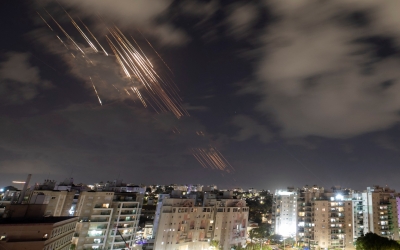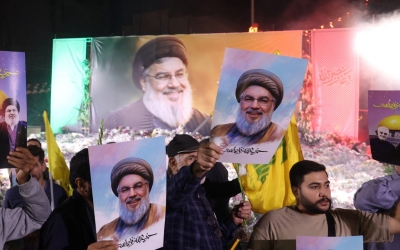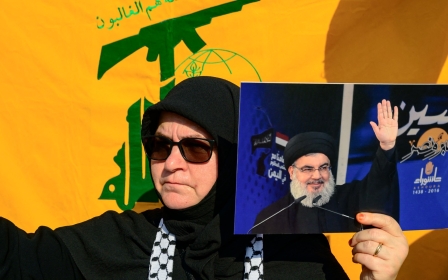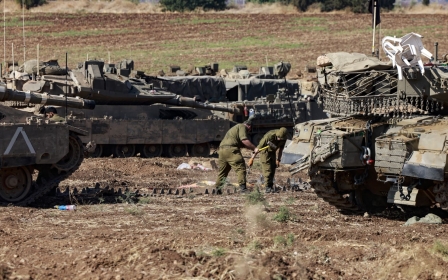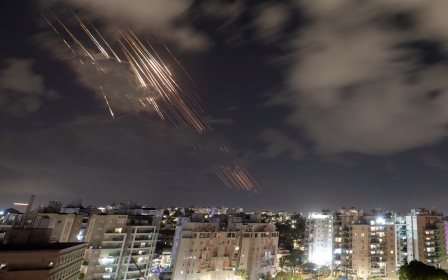Iran says missile attack against Israel was 'legal, rational and legitimate'
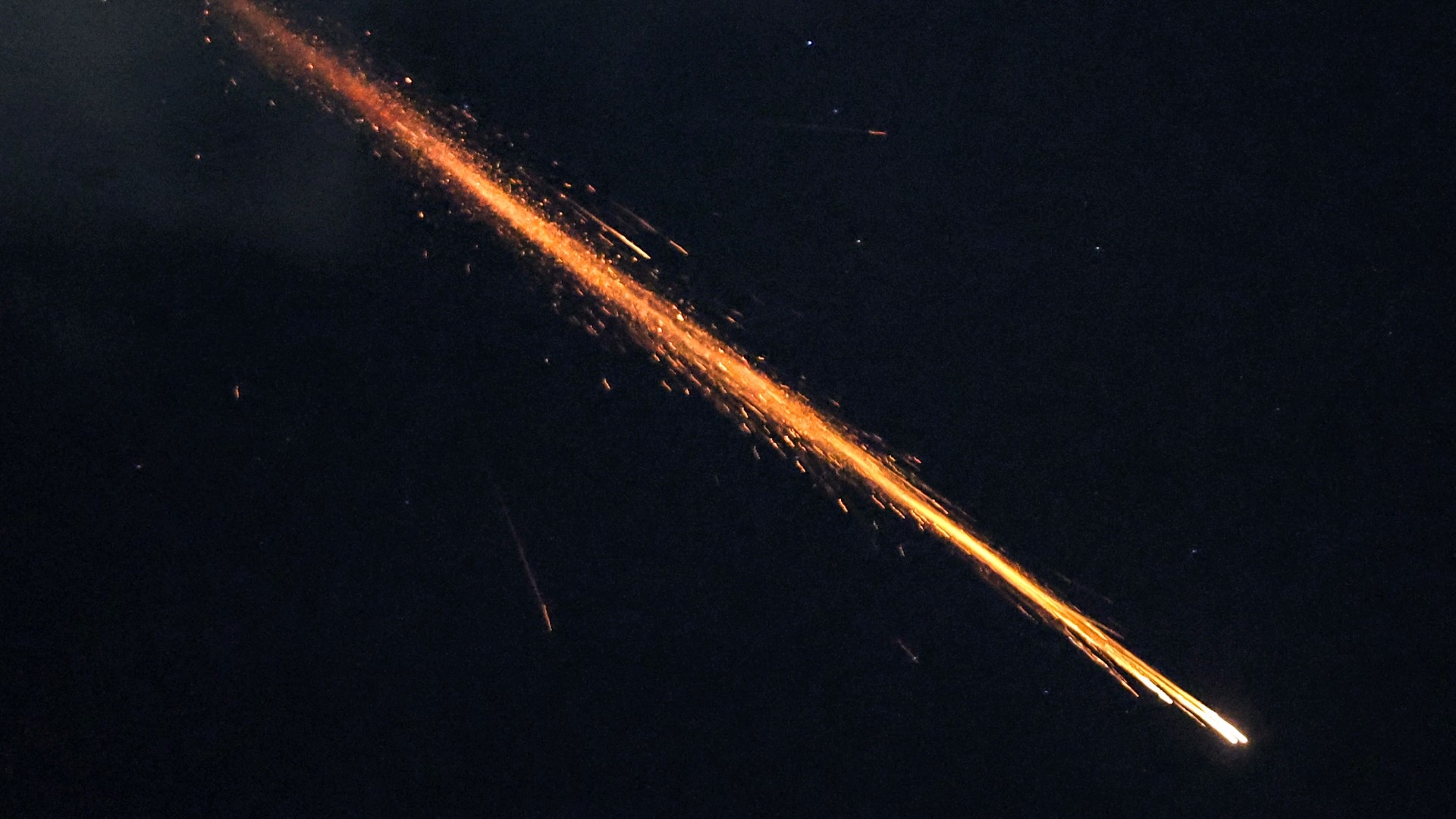
Iran defended its decision to fire a barrage of missiles at Israel on Tuesday, calling it a "legal" response to Israeli "terror attacks" following the killing of several senior Hamas, Hezbollah and Iranian officials in recent months.
Missiles could be seen streaming through the skies over Tel Aviv and Jerusalem late on Tuesday, before the deafening sound of large explosions rang out.
Videos seen by Middle East Eye showed an apparent missile exploding in the vicinity of the Mossad headquarters on the northern outskirts of Tel Aviv. It was unclear if there was any damage as a result.
A number of impact sites were identified across central Israel, with dozens of images of missile fragments circulating on social media. Iran's state television said 80 percent of the missiles launched at Israel hit their targets. MEE could not independently verify the claims.
Israel's military censor has barred local and international media outlets operating in the country from publishing details on the exact locations of the impact sites.
New MEE newsletter: Jerusalem Dispatch
Sign up to get the latest insights and analysis on Israel-Palestine, alongside Turkey Unpacked and other MEE newsletters
Despite the hundreds of missiles being fired, the only injuries reported by Israel were two people who were lightly wounded by shrapnel in Tel Aviv. The Palestinian news agency Wafa, citing the civil defence, said a 38-year-old Palestinian man died from shrapnel wounds in Jericho in the occupied West Bank.
Following the attacks, the Iranian mission at the UN said the decision to fire around 180 missiles at Israel was a "legal, rational and legitimate response to the terrorist attacks of the Zionist regime, which involved the targeting of Iranian nationals and interests and infringing on the national sovereignty of Iran."
It said that should Israel "dare to respond or commit further acts of malevolence, a subsequent and crushing response will ensue… Regional states and the Zionists' supporters are advised to part ways with the regime."
Iran's supreme leader, Ayatollah Ali Khamenei, also praised the attack, calling it the first blow against Israel.
"With God's help, the blows of the uprising front will become stronger and more painful on the worn and rotting body of the Zionist regime," he said.
Iran's Islamic Revolutionary Guard Corps (IRGC) said the missiles were fired in response to the killing of Hamas leader Ismail Haniyeh earlier this year, and the killings of Hezbollah chief Hassan Nasrallah and IRGC commander Abbas Nilforoushan last week.
"In response to the martyrdom of Ismail Haniyeh, Hassan Nasrallah and Nilforoushan, we targeted the heart of the occupied territories," the IRGC said in a statement.
Earlier on Tuesday, the IRGC said that if Israel retaliated, Tehran's response would be "more crushing and ruinous."
Iranian President Masoud Pezeshkian also hailed the attack, calling it "a decisive response to the aggression of the Zionist regime," adding: "Let Netanyahu know that Iran is not a belligerent, but it stands firmly against any threat."
"Do not enter into a conflict with Iran," he said.
Israel warns of retaliation
Iran's decision to fire the missiles at Israel reflects a growing consensus inside Iran that its decision not to mount a military reprisal after the assassination of Haniyeh in Tehran in July was a strategic mistake.
MEE reported at the time Haniyeh, a veteran Hamas official who had played a key role in talks for a potential ceasefire in Gaza, was killed by a projectile fired at his room.
Pezeshkian said he did not respond to Haniyeh's death because he had been given assurances that Israel was on the verge of signing a ceasefire deal within a week or two. No such deal occurred.
Earlier this week, Amir Hossein Sabeti, a hardline member of parliament, accused Pezeshkian of being "deceived by America" and claimed the president had facilitated Nasrallah's assassination by disobeying the supreme leader's orders by halting a retaliation plan following Haniyeh's killing.
Following Friday's killing of Nasrallah, a former conservative Iranian MP told MEE that Israel was behaving like a "rabid dog", adding that it "must be controlled."
"If Iran is to respond to Israel, it must consider pursuing an atomic bomb. If Iran and Israel wish to ignite the region, then Iran should work towards developing nuclear capabilities," the former official said on condition of anonymity due to sensitivities surrounding the issue.
Speaking to reporters late on Tuesday, Israeli military spokesman Daniel Hagari said the attacks were serious and would have consequences "in a timely manner."
Meanwhile, the United States said its forces were ready to provide "additional defensive support" to Israel.
"Our forces remain postured to provide additional defensive support and to protect US forces operating in the region" after "defending against Iranian-launched missiles targeting Israel," a US defence official said on condition of anonymity.
Sina Toossi, a senior non-resident fellow at the Center for International Policy, noted that several IRGC-affiliated Iranian outlets had warned the US against targeting Iranian facilities.
"Iran has warned the US: if you target our refineries, we will set fire to the refineries and oil fields across the entire region, including those in Saudi Arabia, Azerbaijan, Kuwait, the UAE, and Bahrain," Toossi tweeted.
Meanwhile, Iranian-backed Iraqi armed groups said US bases in Iraq and the region will be targets if the US joins any response to Iranian strikes on Israel or if Israel uses Iraqi airspace against Tehran.
The firing of the missiles came after Israeli troops launched ground raids into Lebanon, in the biggest escalation of regional warfare since fighting erupted in Gaza last October.
Middle East Eye delivers independent and unrivalled coverage and analysis of the Middle East, North Africa and beyond. To learn more about republishing this content and the associated fees, please fill out this form. More about MEE can be found here.


